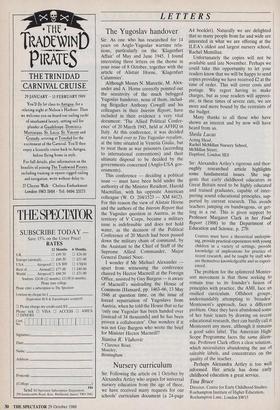Sir: Alexandra Artley's rigorous and thor- oughly researched article highlights
some fundamental issues. She sug- gests that early' childhood educators in Great Britain need to be highly educated and trained graduates, capable of inter- preting sound educational principles, sup- ported by current research. This avoids teachers jumping on bandwagons, or get- ting in a rut. This is given support by Professor Margaret Clark in her Final Report (1988) to the Department of Education and Science, p. 278:
Courses must have a theoretical underpin- ing, provide practical experiences with young children in a variety of settings, provide knowledge of implications for practice of recent research, and be taught by staff who are themselves knowledgeable and so experi- enced.
The problem for the splintered Montes- sori movement is that those seeking to remain true to its founder's fusion of principles with practice, the AMI, face an ossified curriculum. Offshoot groups, understandably attempting to 'broaden' Montessori's approach, face a different problem. Once they have abandoned some of her basic tenets by drawing on recent educational research, they can hardly call it Montessori any more, although it remains a good sales label. The American High/ Scope Programme faces the same dilem- ma. Professor Clark offers a clear solution, which necessitates abandoning the use of saleable labels, and concentrates on the quality of the teacher.
Perhaps Alexandra Artley is too well informed. Her article has done early childhood education a great service.
Tina Bruce
Director, Centre for Early Childhood Studies, Roehampton Institute of Higher Education, Roehampton Lane, London SW15


























































 Previous page
Previous page